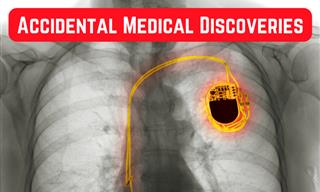

However, catching it early, before becoming overwhelmed by debilitating symptoms, may allow treatment to actually slow the disease's progression. Incredibly, a team of European scientists have come up with a new type of blood test, that is able to identify Alzheimer’s years earlier.
Here's how it works: Up to 20 years before Alzheimer's symptoms appear, structural changes begin to take place in your brain. Amyloid plaque tends to build up in the brain, yet the only way to detect it is to have an expensive scan or an invasive test undertaken. Unfortunately, this is only something that usually happens after a patient has exhibited severe symptoms.


Dr. Gerwert then tested 65 archived blood samples of patients who would go on to develop Alzheimer's years later. To improve the procedure's accuracy, he also screened samples from an additional 809 healthy adults. The test was found to be able to correctly identify people with Alzheimer's over 70% of the time. Incredibly, it was found that it could do so even up to 8 years before a person is diagnosed with Alzheimer's.
Before being available for use on the general public, this blood test will first have to undergo larger scale testing. The team's research will also be used to help test an early blood test for Parkinson’s Disease, too.

Discovery: Use of Blood Thinners May Prevent Dementia
A new study shows how blood-thinning drugs can help to prevent the onset of dementia. Find out how they work here.

New Research Reveals a Link Between Bacteria & Alzheimer's
Groundbreaking new research has found a connection between Alzheimer's disease and certain types of bacteria in the brain. Learn more here.

If You Like to Sleep in, We Have Some Bad News For You...
A new study shows that there's a link between sleeping too much and getting dementia (or even dying early). Read all about it here.

How To Take Control Of Your Wellbeing Through Breathing
Breathing seems obvious to most of us, but there is an art to it. Becoming conscious of your breathing could greatly benefit your mental and physical health.

Here's the Latest Alzheimer's Breakthrough: Zombie Cells
Scientists have found a way to cure the stressed, toxic, zombie cells found in mice with Alzheimer's. Read all about it here.

Worried About Alzheimer's? This Guide Is All That You Need
Learn about the signs, symptoms, and treatment options for Alzheimer's disease in our detailed guidebook.Please visit us here again to check for updates.
 5:32
5:32
The Science Behind Why Laughter is the Best Medicine
They say laughter is the best medicine. But why exactly do we laugh?

Wow! Who Knew That Jupiter Was So Mesmerizing?
Take a look at Jupiter like you've never seen it before!
 1:11
1:11
The COOLEST Flames in the World - Jaw-Dropping!
Have you ever seen a flame as epic as this? Find out how it's made...

2023 in Science: Biggest Discoveries You Missed!
Let’s take a look at the most amazing scientific discoveries that made news this year.
 6:31
6:31
The Psychology Behind Why Some People Are Habitually Late
Now we finally know why some people are habitually late.

Science Proves: These 10 Bible Stories Probably Did Happen
The Bible describes many seemingly supernatural cases, but today, science can show that they might have indeed happened.
 4:13
4:13
What Does Medicine ACTUALLY Do In the Body? Fascinating.
What really happens in our bodies when we take medicine, have you ever wondered? This video will answer your question.

5 Puzzling Mysteries That Science Finally Managed to Solve
These weird occurrences have puzzled humanity for decades, if not centuries. Finally, scientists solved them & the solutions are exciting...

6 Fascinating Stories of Accidental Medical Discoveries
From penicillin to pacemakers, here are the medical breakthroughs that were discovered by accident.
 13:38
13:38
24 Smart Storage Inventions You Didn't Know You Needed
These super useful inventions are designed to make you help space!
 14:49
14:49
This Man Built an Automatic Train System for Trash Cans!
Wouldn’t it be cool if a robot picked up and moved our garbage out for pickup with the push of a button?

Remembering the Life and Wisdom of Stephen Hawking
Stephen Hawking possessed one of the greatest minds the world has ever seen, but was also impaired by a debilitating disease. Here are his life ant times.
 12:57
12:57
The Curious Science of Tricking Your Taste Buds
Did you know you could confuse your sense of taste? Find out how!

There are Some Great Secrets Found in Mathematics...
Numbers hold some great secrets - they even tell us about life!
 5:48
5:48
3 Surefire Ways to Always Identify Pseudoscience
Find out how you can identify pseudoscience, and learn how it differs from actual science.
 2:01
2:01
What Does the Appendix Actually DO?
Dr. Berg explains, in this video, all about the appendix and what it actually does in our body.

New Study: There is a Sure Way to Slow Aging
This new study confirms what has long been suspected: The less calories we consume, the slower we age.

17 Experiments That Produced Very Bizarre Results...
Take a look at this collection of photos showing how common people performed some fascinating accidental scientific experiments.
 7:00
7:00
How To Be Sure Your Dog Adores You
10 scientific ways to know if your dog loves you
 5:13
5:13
Whatever Happened to that Hole in the Ozone Layer?
Let's embark on this enlightening journey to better understand our atmosphere's health.

The Surprisingly Convoluted History of Traffic Lights
What did the first-ever traffic light look like? Probably stranger than you imagine...
 11:39
11:39
Is There Any Way To Destroy or Deflect Asteroids?
Watch an interview with Cathy Plesko, a leading scientist working on preparing for the dangers of an asteroid attack
 2:34
2:34
Let's Talk About Size, From Big to Huge.
an incredible discovery that leads us to a better and better understanding of these objects' true size.
 4:34
4:34
Fascinating Science: How Old Can We Actually Get?
All things being equal, and technology continually progressing - How old can a human body really get?

You Won't Believe That These Things Exist in Japan...
If there's one place on this planet that well and truly at the forefront of modern technology, it has got to be Japan, as these inventions prove...

These Ancient Inventions Have Got Scientists Stumped!
Here are 12 items from long ago which prove that our ancestors possessed knowledge and skills far more advanced than we once believed them to be.
 12:22
12:22
These Experiments Remind Us Water Isn't Just For Drinking
This video will make you stop and think for a second the next time you're having a glass of water as you remember the brightly colored experiments that this video shows us you can do with water

How Can You Recognize a Fake Gadget Before Buying It?
More often than not, you're almost unable to recognize them. So, before purchasing the product you want to have, bear in mind the following tips:
 1:44
1:44
The Accidental Discovery of the World’s First Antibiotic
Not too long ago, it was fairly common to die of the simplest of wounds due to bacterial infection. Penicillin changed everything.

14 of the Most Fascinating Specialized Tools You'll See
We bet you haven’t seen these unique tools before!
 4:52
4:52
Are There Universal Expressions of Emotion? Find Out Here!
Do facial expressions look the same and communicate the same meaning wherever you are in the world? Find out here!
 16:55
16:55
Sleep Inventions: 16 Gadgets to Help You Doze Off
If you frequently struggle with sleep, then trying these amazing new sleep innovations could help change your life.

Incredible New Bionic Arm Fuses With Woman's Nerves
Karin's bionic hand is real sci fi, making her one of the first true cyborgs.

Here Are the 16 Oldest Household Objects in the World
If you think ancient life is remote, these pre-historic household items will make you think again. Just look at how old they are!

Incredible Science Breakthroughs That Made News in 2022
Let’s check out some of the most interesting scientific discoveries of 2022.
 3:10
3:10
How It's Made: Merino Wool
Long before we invented moisture-wicking synthetic fibers, this type of wool did it naturally for centuries. Here's how it's produced.
 8:24
8:24
Why is Everyone Obsessed with This Weight-Loss Tool?
Ozempic has been touted as a wonder drug for weight loss in recent months. But what's the real truth behind it?

Incredible: First-Ever Complete Map of an Insect's Brain
This incredible project is the first to completely map the brain of an insect, a monumental undertaking even for such a small creature.

TRIVIA: 25 Shocking Differences Between the Sexes
Did you know that there are some vast differences between the sexes? These 25 scientific facts will probably come as a big surprise to you, they did to me.
 5:08
5:08
Erecting a Behemoth: Installation of an Offshore Oilrig
How do they install an offshore oilrig? This video will show you, step by step, how it is done.
 30:04
30:04
50 Crazy But True Facts About Dreams You Need to Know
Here are some strange and unusual facts about dreams that will surprise you.


